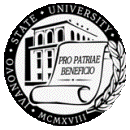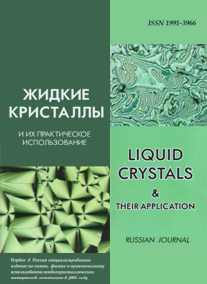|

|
Liquid Crystals and their Application
Russian Journal Zhidkie kristally i ikh prakticheskoe ispol'zovanie Жидкие кристаллы и их практическое использование |

|
|

|

|
|
|
Menu

|
|
|
|
|
Zhidk. krist. ikh prakt. ispol'z. = Liq. Cryst. and their Appl., 2014, 14 (4), 49—58. |

|
|
Biaxial Nematic Phases in Tridisperse Mixtures of Hard Uniaxial Particles
|
E. P. Sokolova, A. Yu. Vlasov
|
Author affiliations
Department of Chemistry, St. Petersburg State University,
Universitetsky Pr., 26, 198504 St. Petersburg, Russia
E-mail: esok@AM7940.spb.edu
|
|
Abstract
We consider the effect of doping the system by long rod-shape particles (L) upon stability of a biaxial nematic (Nb) with regard to demixing into uniaxial nematics N+ and N- in the athermal system (R–P) of rods and plates with small aspect ratios values (γR = 5, γP = 1/5). The restricted orientation (Zwanzig) model of a multi-component system of rectangular parallelepipeds is employed, wherein collective interactions are accounted for on the level of the 3rd virial approximation. The second-order ���N+–Nb and N-–Nb phase boundaries were located numerically from the data on biaxiality parameters in the vicinity of bifurcation points, where the said quantities show up as infinitesimal. Thermodynamic stability of biaxial phases in the ternary systems was estimated from the calculated values of the Gibbs energy spanning the concentration intervals of pseudobinary (P–R) mixtures given constant mole fraction (γL) of component L. It is demonstrated that stabilization of the Nb phase is plausible along the sections of the composition triangles with γL ≥ 0,01, provided γL ≥ 8. The stability domain of the Nb phase expands by increasing L component particle volume while keeping γL fixed.
Keywords: biaxial nematic phase; the Zwanzig model; сolloidal liquid crystals;rod-plate mixtures
|
|
|
|
|
|




